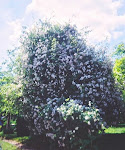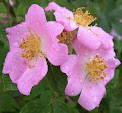In 1910, storm clouds were beginning to gather over Europe, at least for those who could see them. The English had become so alarmed at increasing Prussian militarism, that in 1908 Kaiser Wilhelm declared the English "mad as hares" for harbouring suspicions of German intentions.
It is against this background then that we must see the 1910 publication by the English writer Gilbert Keith (G.K.) Chesterton (1874 - 1936) of a collection of essays entitled "Alarms and Discursions". One of these essays is a disquisition on the rose entitled "The Wrath of the Roses".
His essay concludes as follows:
"But the rose itself is royal and dangerous; long as it has remained in the rich house of civilization, it has never laid off its armour. A rose always looks like a mediaeval gentleman of Italy, with a cloak of crimson and a sword: for the thorn is the sword of the rose.And there is this real moral in the matter; that we have to remember that civilization as it goes on ought not perhaps to grow more fighting - but ought to grow more ready to fight. The more valuable and reposeful is the order we have to guard, the more vivid should be our ultimate sense of vigilance and potential violence. And when I walk round a summer garden, I can understand how those high mad lords at the end of the Middle Ages, just before their swords clashed, caught at roses for their instinctive emblems of empire and rivalry. For to me any such garden is full of the wars of the roses."
Today, on the day after Osama bin Laden was located and slain by American forces deep inside Pakistan, this is food for thought indeed. We have a "valuable and reposeful order" to defend and the thorns, sadly, must stay on the rose.


Thank you, Rhodon. I am greatly enjoying your blog which I just found tonight. I have not read Gertrude Jekyll's book so I'm eagerly reading it here. This particular post is so interesting. I know G.K. Chesterton as a Christian writer, but I'm unfamiliar with the bulk of his writing. I found this essay so relevant in our times and how thought provoking that he speaks of the rose (it seems to me) as a deterrent to fighting on the order of Reagan's 'peace through strength', and I appreciate your point at the end. If you don't mind, I'd like to link your blog on mine even though true English gardens aren't feasible in Florida, because we are adaptive gardeners down here and who knows what one of us might come up with from the wealth of knowledge on your blog. Thank you again.
ReplyDeleteThank you Sherryocala - I'm glad you like the blog. As you suggest, G.K. Chesterton is most famous for his "Father Brown" novels in which his eponymous hero, a Catholic priest, uses insights from the religious life to solve worldly mysteries, all in the tradition of detective fiction. However he is probably best loved for his humorous ballads. My favourite is his defence of wine drinking, entitled "Wine and water" in which he has Noah declare, as 40 days of rain begin:
ReplyDelete"But I don't care where the water goes if it doesn't get into the wine."